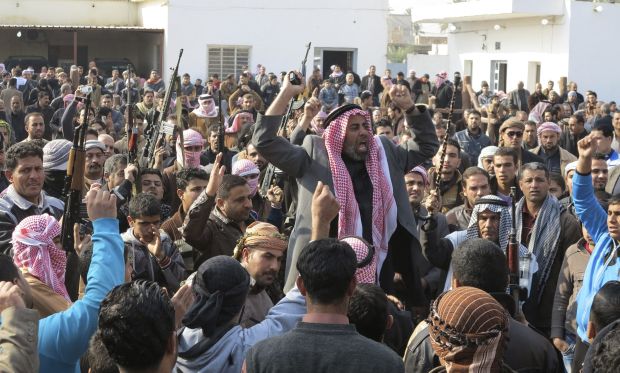
Residents gather to protest near the house of prominent Sunni Muslim lawmaker Ahmed al-Alwani, in the centre of Ramadi, on December 29, 2013. (Reuters/Ali al-Mashhadani)
Ramadi, Iraq, Asharq Al-Awsat—The family of former Iraqi MP Ahmed Al-Alwani, who is currently in prison facing a death sentence for terrorism-related activities, has renewed claims that his conviction was based on confessions obtained through torture under the Nuri Al-Maliki government.
Alwani, a prominent Sunni figure in Iraq’s western Anbar province, was arrested in December 2013 in a deadly government raid on his home that resulted in the death of his brother Ali and five guards. Alwani had been a staunch supporter of anti-government protests in Ramadi and an outspoken critic of former prime minister Maliki. Many believe that his arrest and subsequent prosecution were politically motivated.
Alwani made headlines this week after images of the former MP appeared showing him looking frail and malnourished.
Asharq Al-Awsat visited the Alwani family home in Ramadi to discuss the ex-MP’s detention and efforts to secure a retrial.
“My brother told us that he was psychologically and physically tortured in the days after his arrest in order to extract confessions from him,” Adel Alwani told Asharq Al-Awsat.
Human rights organizations have previously highlighted the defendant’s claims that he had been subjected to torture and denied access to lawyers during interrogation. Family members told Human Rights Watch they saw torture marks on Alwani before his trial.
The family said that they were prevented from visiting him in prison and attending the trail. “We were completely prohibited from visiting him in prison for more than a year. We could not even see him in court. Some MPs, who we will always be grateful to, would attend the legal proceedings and inform us of his condition. MPs have parliamentary immunity and were allowed to attend the trial in their official capacity. But the circumstances did not allow them to speak to him freely,” Adel said.
“I used to go with the MPs sometimes but I was barred from entering the courtroom. I could only speak to my brother on the phone for five minutes but I could see the large security force that would take him to and from court—it was as if they were guarding a dangerous criminal,” he added.
Adel Al-Alwani said that all the family’s requests to visit Ahmed were rejected, and that his defense lawyer, Badie Aref, was pressured to drop the case. “He told us he had received threats by known parties and had been detained for 24 hours by government forces. He told us that his life was in danger.”
Alwani was sentenced to death in November 2014 for his alleged role in the death of two soldiers during a protest.
However it seems that there has been a loosening of restrictions placed on the ex-MP, with Adel Al-Alwani and other members of the Alwani family being allowed to visit him at the request of Iraqi parliamentary speaker Salim Al-Jubouri.
Adel said that the torture continued until Haider Al-Abadi became prime minister in September. “After this, treatment changed positively and the food that my brother was served improved,” Adel added.
The Alwani family now hopes that the verdict against Ahmed will be overturned and that he will be granted a retrial. “The verdict, according to many legal specialists, contains a number of errors. This verdict was issued without the scene of the alleged crime even being investigated. This is not to mention the politicized atmosphere that the investigation process was conducted under and the forceful extraction of confessions through torture,” Adel told Asharq Al-Awsat.
